外研版七年级英语下册详细知识点汇总-精品
外研版英语七年级下册各单元知识点汇总
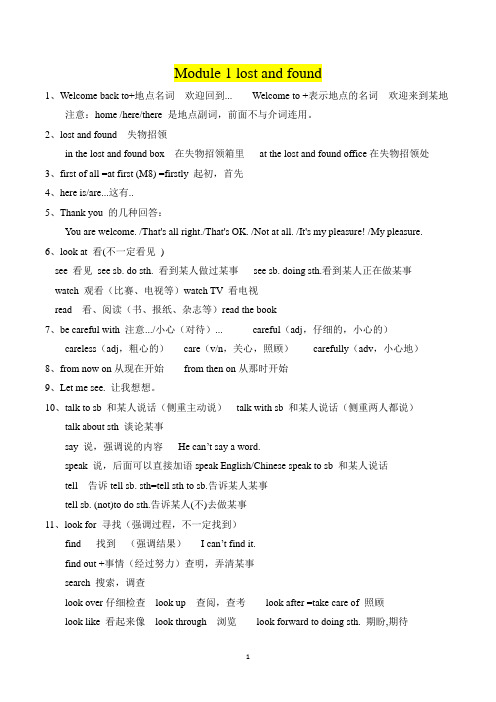
Module 1 lost and found1、Welcome back to+地点名词欢迎回到... Welcome to +表示地点的名词欢迎来到某地注意:home /here/there 是地点副词,前面不与介词连用。
2、lost and found 失物招领in the lost and found box 在失物招领箱里at the lost and found office在失物招领处3、first of all =at first (M8) =firstly 起初,首先4、here is/are...这有..5、Thank you 的几种回答:You are welcome. /That's all right./That's OK. /Not at all. /It's my pleasure! /My pleasure.6、look at 看(不一定看见)see 看见see sb. do sth. 看到某人做过某事see sb. doing sth.看到某人正在做某事watch 观看(比赛、电视等)watch TV 看电视read 看、阅读(书、报纸、杂志等)read the book7、be careful with 注意.../小心(对待)... careful(adj,仔细的,小心的)careless(adj,粗心的)care(v/n,关心,照顾)carefully(adv,小心地)8、from now on从现在开始from then on从那时开始9、Let me see. 让我想想。
10、talk to sb 和某人说话(侧重主动说)talk with sb 和某人说话(侧重两人都说)talk about sth 谈论某事say 说,强调说的内容He can’t say a word.speak 说,后面可以直接加语speak English/Chinese speak to sb 和某人说话tell 告诉tell sb. sth=tell sth to sb.告诉某人某事tell sb. (not)to do sth.告诉某人(不)去做某事11、look for 寻找(强调过程,不一定找到)find 找到(强调结果)I can’t find it.find out +事情(经过努力)查明,弄清某事search 搜索,调查look over仔细检查look up 查阅,查考look after =take care of 照顾look like 看起来像look through 浏览look forward to doing sth. 期盼,期待12、get on/off the bus 上/下公交车get in/out of the car 上/下小车13、in a hurry 匆匆忙忙hurry up=come on 快点儿,赶紧hurry to do sth 匆忙去做某事(there’s)no hurry 不忙,不必着急P8314、every day 每天时间状语everyday 每天的,日常的(形容词,后面接名词)15、many other things 许多其他的东西16、at the/ this moment=now此时此刻,现在at that moment=then 在那时17、a lot of =lots of =some许多既可以修饰可数名词,也可以修饰不可数名词。
七年级下册英语外研版m10知识点
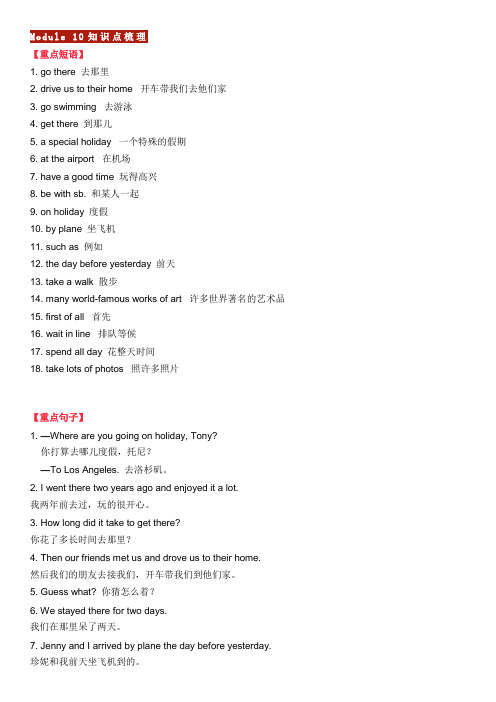
10【重点短语】1. go there 去那里2. drive us to their home 开车带我们去他们家3. go swimming 去游泳4. get there 到那儿5. a special holiday 一个特殊的假期6. at the airport 在机场7. have a good time 玩得高兴8. be with sb. 和某人一起9. on holiday 度假10. by plane 坐飞机11. such as 例如12. the day before yesterday 前天13. take a walk 散步14. many world-famous works of art 许多世界著名的艺术品15. first of all 首先16. wait in line 排队等候17. spend all day 花整天时间18. take lots of photos 照许多照片【重点句子】1. —Where are you going on holiday, Tony?你打算去哪儿度假,托尼?—To Los Angeles. 去洛杉矶。
2. I went there two years ago and enjoyed it a lot.我两年前去过,玩的很开心。
3. How long did it take to get there?你花了多长时间去那里?4. Then our friends met us and drove us to their home.然后我们的朋友去接我们,开车带我们到他们家。
5. Guess what? 你猜怎么着?6. We stayed there for two days.我们在那里呆了两天。
7. Jenny and I arrived by plane the day before yesterday. 珍妮和我前天坐飞机到的。
外研版七年级下册英语重点知识点汇总

外研版七年级下册英语重点知识点汇总Module 1 Lost and FoundIn this module。
we learn some XXX related to lost and found items。
Firstly。
we have the "lost and found box," which is aplace where lost items are kept until they are claimed。
We also learn to be careful with our belongings and to look for lost items。
From now on。
we should try to be more XXX.If we do lose something。
we can try to find it by looking around and asking others for help。
It's XXX hundreds of items are lost every day。
so we should be XXX in our search。
First of all。
we should check the lost and found box to see if our item has been turned in。
If we don't find it there。
we can try to ask around and see if anyone has seen it.When looking for lost items。
we can choose from different methods。
We can try to find it ourselves。
or we can ask othersfor help。
外研版七年级下册英语重点知识点汇总
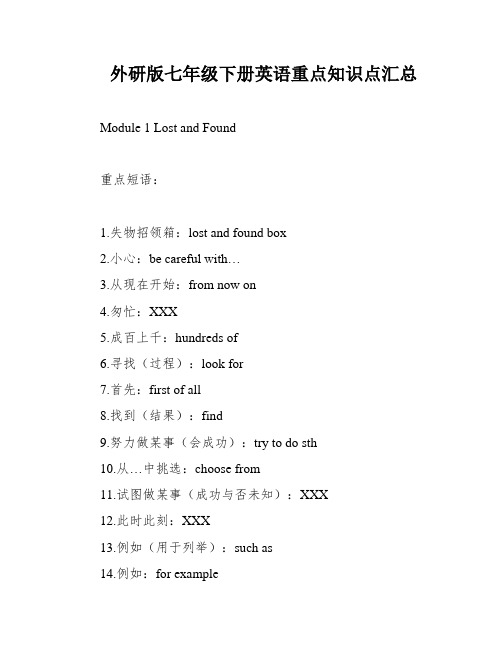
外研版七年级下册英语重点知识点汇总Module 1 Lost and Found重点短语:1.失物招领箱:lost and found box2.小心:be careful with…3.从现在开始:from now on4.匆忙:XXX5.成百上千:hundreds of6.寻找(过程):look for7.首先:first of all8.找到(结果):find9.努力做某事(会成功):try to do sth10.从…中挑选:choose from11.试图做某事(成功与否未知):XXX12.此时此刻:XXX13.例如(用于列举):such as14.例如:for example重点句型:1.这是谁的 (XXX)2.帮助某人做某事:help sb do XXX.3.请小心保管…:XXX…4.欢迎来到…:e to +地点5.给某人打call sb at +电话号码语法总结:物主代词:表示所属关系的代词(…属于谁的)单数:人称形容词性物主代词名词性物主代词第一人称 my XXX第二人称 your yours第三人称 his hers its复数形容词性物主代名词性物主代第一人称 our ours第二人称 your yours第三人称 their theirs形容词性物主代词:必须和名词在一起,例如XXX,your XXX…名词性物主代词:相当于与之相对应的形容词性物主代词+名词,例如XXX.Module 2 What Can You Do?重点短语:1.与某人相处融洽:get on well with sb.2.弹钢琴:play the piano3.打乒乓球:play table XXX4.…怎么样?=how about…。
what about…5.担心…:XXX…6.擅长做某事:be good at doing sth.7.放风筝:fly a kite重点句型:无语法总结:无2.high-tech高科技的3.XXX虚拟现实4.XXX机器人仆人5.XXX太空旅行6.XXX可再生能源7.self-driving cars自动驾驶汽车8.ic engineering基因工程9.XXX寿命10.artificial intelligence人工智能重点句型】1.In the future。
外研版英语(新标准)七年级下册模块知识点归纳总结(全册)
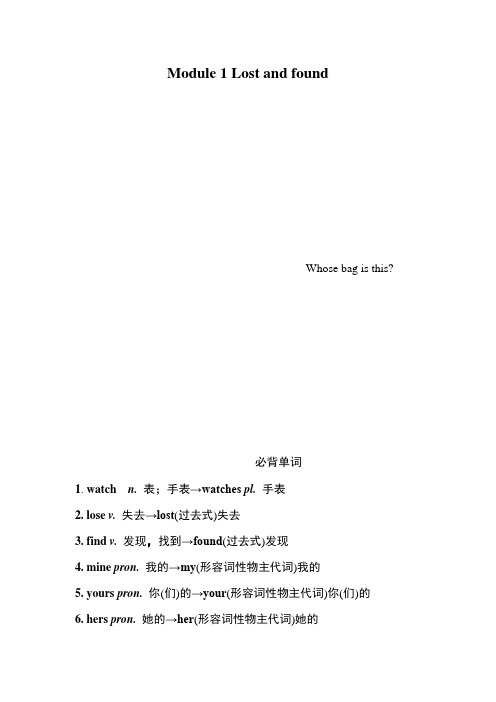
Module 1 Lost and foundWhose bag is this?必背单词1. watch n.表;手表→watches pl.手表2. lose v.失去→lost(过去式)失去3. find v.发现,找到→found(过去式)发现4. mine pron.我的→my(形容词性物主代词)我的5. yours pron.你(们)的→your(形容词性物主代词)你(们)的6. hers pron.她的→her(形容词性物主代词)她的7. careful adj.仔细的;认真的;小心的→carefully adv.仔细地;认真地;小心地8. crayon n. 蜡笔9. eraser n. 橡皮擦10. glove n. 手套11. wallet n. 钱包12. whose pron. 谁的13. tape n. 录音带;录像带14. purple adj. 紫色的;紫红色的;n. 紫色;紫红色必背短语15. first of all 首先,第一16. look at 看17. be careful with 小心(对待)……18. from now on 从现在开始19. a lot of 许多,大量20. lost and found box 失物招领箱必背句子21. Welcome back to school, everyone!欢迎大家返校!22. Whose bag is this?这是谁的书包?23. Here's a purple wallet!这里有一个紫色的钱包!24. Let me see...让我看看……Are they yours?必背单词1. leave v.丢下;遗忘→left(过去式)丢下;遗忘2. strange adj.奇怪的→stranger n.陌生人3. camera n. 照相机4. phone n. 电话;电话机5. plane n. 飞机6. taxi n. 出租车7. why adv. 为什么8. airport n. 机场;航空港9. hundred num. 百10. thousand num. 千11. boat n. 船12. duck n. 鸭13. pig n. 猪14. sausage n. 香肠;腊肠必背短语15. mobile phone 移动电话;手机16. lost and found office 失物招领处17. in a hurry 匆匆忙忙18. hundreds of 几百;成百上千19. look for 寻找20. at the moment 目前;此时必背句子21. Welcome to the New York City Lost and found office.欢迎来到纽约市的失物招领处。
最新外研版七年级英语下册知识点整理(最新整理)

外研版七年级下册知识点整理MODULE 1 Lost and Found重点短语1. lost and found box 失物招领箱2. welcome back 欢迎回来3.first of all 首先4. here is/are... 这有...5. from now on 从现在开始6. be careful with 小心保管7. whose bag 谁的包8. talk to sb. 与某人交谈9. mobile phone 移动电话,手机10. get on 上车( get off 下车)11. two thousand 两千(thousands of 数以千计的...)12. look for 寻找13. at the moment 现在14. in a hurry 匆忙地15. A lot of 许多,大量16. hundreds of 数以百计的17. on the train 在火车上18. every day 每天19. such as 例如20. make a list of 列一张...的清单21. ask/answer questions 问/回答问题重点句子:1.Welcome back to school! 欢迎回到学校。
2.Whose bag is this? 这是谁的书包?3.It’s mine. 它是我的。
4.Are these crayons yours? 这些是你的蜡笔吗?5. Whose tapes are these? 这些是谁的磁带?6. Here’s a purple wallet! 这儿有个紫色钱包。
7. I think it’s Betty’s. Lingling. 我认为它是玲玲的。
8. Everyone, please be careful with your things from now on. 请大家从今以后仔细对待你们的东西。
(完整版)外研版七年级英语下册知识点归纳及练习

MODULE1一、词汇。
1. listen 听(强调动作)hear 听见(强调结果)I listened carefully but I heard nothing. 我仔细听但什么也没听到2.on a (school) trip3. have a good time = enjoy oneself4. take pictures = take photos5. lie in the sun躺在阳光下lie on the beach 躺在沙滩上躺下【动】She is lying on her back. 她正仰卧着。
位于【动】London lies on the River Thames 伦敦位于泰晤士河畔说谎【动】You are lying to him! 你在对他说谎。
eg: Look! The boy ________on the bed and reading a book.A. is lyingB. lyingC. liesD. lie6. send sb. a postcard 寄给某人一张明信片send sth. to sb. = send sb. sth.7. anyway 无论如何(转移话题)8. buy some presents 买礼物buy sth. for sb. = buy sb. sth.9. enjoy sth. 喜欢某物enjoy oneself = have a good/ great time 玩的开心enjoy/ like doing sth. 喜欢做某事10. at this moment=now 此时此刻(现在进行时)11. leave work 下班be at work 上班He is at work. = He is working12. wait for buses 等公共汽车run for trains 赶乘火车(地铁)13. have afternoon tea 喝下午茶14. watch a ballet 看芭蕾see friends 看望朋友get dressed = dress oneself 穿衣;打扮eg: The boy can’t dress himself.15. call home 给家里打电话call sb. = give sb. a call= phone sb.二、语法。
外研版七年级下册英语知识点归纳
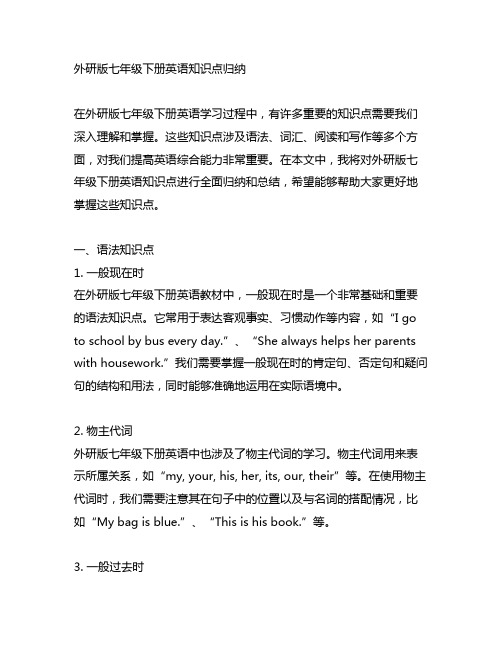
外研版七年级下册英语知识点归纳在外研版七年级下册英语学习过程中,有许多重要的知识点需要我们深入理解和掌握。
这些知识点涉及语法、词汇、阅读和写作等多个方面,对我们提高英语综合能力非常重要。
在本文中,我将对外研版七年级下册英语知识点进行全面归纳和总结,希望能够帮助大家更好地掌握这些知识点。
一、语法知识点1. 一般现在时在外研版七年级下册英语教材中,一般现在时是一个非常基础和重要的语法知识点。
它常用于表达客观事实、习惯动作等内容,如“I go to school by bus every day.”、“She always helps her parents with housework.”我们需要掌握一般现在时的肯定句、否定句和疑问句的结构和用法,同时能够准确地运用在实际语境中。
2. 物主代词外研版七年级下册英语中也涉及了物主代词的学习。
物主代词用来表示所属关系,如“my, your, his, her, its, our, their”等。
在使用物主代词时,我们需要注意其在句子中的位置以及与名词的搭配情况,比如“My bag is blue.”、“This is his book.”等。
3. 一般过去时另外,一般过去时也是外研版七年级下册英语中一个重要的语法知识点。
一般过去时用来表示过去发生的动作或状态,常常与表示过去的时间状语连用,如“last week, yesterday”等。
我们需要掌握一般过去时的构成和用法,能够正确地运用在句子中。
二、词汇知识点1. 数词外研版七年级下册英语中还包括了数词的学习。
数词用来表示数量,有基数词和序数词之分,如“one, two, three, first, second, third”等。
在学习数词时,我们需要注意其在句子中的位置和用法,同时能够正确地读写和运用。
2. 表示时间的词汇除了数词,还有一些表示时间的词汇也是我们需要掌握的,比如“week, month, year, hour, minute, second”等。
- 1、下载文档前请自行甄别文档内容的完整性,平台不提供额外的编辑、内容补充、找答案等附加服务。
- 2、"仅部分预览"的文档,不可在线预览部分如存在完整性等问题,可反馈申请退款(可完整预览的文档不适用该条件!)。
- 3、如文档侵犯您的权益,请联系客服反馈,我们会尽快为您处理(人工客服工作时间:9:00-18:30)。
外研版七年级英语下册详细知识点汇总Module 1一、词汇1. 辨析watch,look,look at与seewatch是及物动词,意思是“观看;注视”,常用来指看电视、看球赛、看戏等。
look为不及物动词,单独使用,用以引起对方的注意。
look at是由动词look和介词at组成的词组,后面可以带宾语,侧重“看”的动作。
see为及物动词,意为“看见”,侧重“看”的结果。
2. call v. ①打电话call sb. 给......打电话 call +某人+ at +电话号码(用这个号码打电话给某人)eg: Please call John at 035-7328. 请打0357328找约翰。
②称呼eg: They call me Tina. 他们叫我蒂娜。
3.辨析every day和everydayevery day 是副词词组,在句子中间做状语,表示“每天,天天”。
eg: We speak English everyday.everyday是形容词,在句子中只做定语,表示“日常的,每天的”。
eg: Let’s learn some everyday English.4. 辨析everyone和every oneeveryone意为“每个人”,只指人,不指物,不与of短语连用。
Everyone在句中作主语时,谓语动词要用第三人称单数形式。
eg: Is everyone here today? 今天大家都来了吗?every one既可以指人,也可以指物,可与介词of连用。
eg: Every one of us has a chance to speak at the meeting.我们每个人都有机会在会上发言。
5. 辨析look for与findlook for意为“寻找”,指有目的的找,强调“寻找”这一动作。
eg: What are you looking for?你在找什么?I’m looking for my bike.我在找我的自行车。
find意为“找到;发现”,强调“找”的结果,其宾语往往是某个丢失的东西或人。
eg: I’m looking for my bag, but I can’t find it. 我找我的书包,但我没找到。
6.辨析talk, speak, tell与saytalk意为“谈话;讲话”,如果只有一方对另一方说话时,一般用talk to,如果双方或多方交谈时,多用talk with。
speak意为“说话;讲话”,后面常接语言。
speak to 意为“和……谈话、讲话”tell意为“告诉;讲述”。
tell sb. sth. 告知某人某事tell sb. to do sth.告诉某人去做某事tell sb. not to do sth. 告诉某人不要做某事say 意为“说”,后常跟说话内容。
二、短语1.lost and found boxlost和found分别是动词lose和find的过去分词形式,过去分词可以修饰名词作定语,lost在这里意为“丢失的”,found意为“找到的”,它们作定语修饰名词box。
2.look for 寻找由于for是介词,所以后面要接名词或代词作宾语,look for sth.意为“寻找某物”,使用时注意,look for不能分开使用。
eg:They are looking for their phones, cameras, watches, computers and many other things. 他们正在寻找他们的电话、照相机、手表、电脑和其他许多东西。
注意:find 强调“找”的结果,而look for 强调“找”的过程。
eg:I’m looking for my watch, but can’t find it. 我在找我的手表,但是找不到.3.in a hurry匆匆忙忙地介词短语,hurry动词短语用“hurry up”来表示“赶快,赶紧”,“(there’s) no hurry”意为“不忙,不必着急,有充裕时间……”。
eg:There is no hurry, so do it slowly and carefully. 不必赶时间,要慢慢地,认真地完成任务。
We must hurry up if we want to be there on time. 如果想准时到那里的话,我们就必须动作快点。
三、句型1.Here is / are …这儿有……,……在这儿(用于刚找到某人或某物时)是一个完全倒装句结构,当主语为代词时部分到装。
eg:Here is the address. 这是那里的地址。
四、语法1.名词性物主代词物主代词分形容词性物主代词与名词性物主代词。
(1)形容词性物主代词相当于一个形容词,在句中作定语用,其后一定要接名词。
如: my pen我的钢笔 your bag你的书包 his bike他的自行车 her desk她的书桌its name它的名字eg: Is that your bike? 那是你的自行车吗?Those are our books. 那些是我们的书。
如果名词前有形容词性物主代词,就不能同时用冠词(a, an, the)或指示代词(this, that, these, those)修饰此名词。
注意:形容词性物主代词与形容词一起修饰名词时,要放在形容词之前。
如: his English books 他的英语书 their Chinese friends 他们的中国朋友(2)名词性的物主代词相当于一个名词,在句中作主语、表语或宾语,能单独使用。
名词性物主代词=相应的形容词性物主代词+名词人称代词与物主代词五、知识拓展1. whose一般是就物主代词或名词所有格提问。
(1)提问部分作定语时,用“Whose +名词+一般疑问句?”结构。
eg: It’s my shirt.→Whose shirt is it?这是我的衬衫。
→这是谁的衬衫?2) 提问部分作表语时,用“Whose +一般疑问句?”结构。
eg: The shirt is mine. →Whose is the shirt?这件衬衫是我的。
→这件衬衫是谁的?Module 21.join v. ①加入(团体,组织,参军)eg:I joined the Party in 1975. 我1975年入党。
His brother joined the army two years ago. 两年前他哥哥参军。
②接人称代词的宾格形式,表示和某人一起进行某活动,还有“连接”的意思。
eg:We want to go to a movie. Do you want to join us? 我们想去看电影, 你和我们一起去吗?They are planning to join the two towns by a railway. 他们在计划用一条铁路把两个镇连接起来。
2.辨析join与take part injoin指加入某党派、某组织或某社会团体,以及参军等,还可表示参与某种活动。
eg:① I will never forget the day when I joined the Party. 我永远也忘不了入党的那一天。
② Will you join us for dinner? 请你和我们一起吃饭好吗?take part in指参加群众性活动、会议、劳动、游行等,往往指参加者持有积极的态度,起一份作用,有时与join in可互换。
eg:①Will you take part in the English evening? 同我们一起参加英语晚会好吗?②All the students took an active part in the thorough cleaning. 所有的学生都积极参加了大扫除.3.worry①作及物动词,意为“使烦恼,使焦虑”,常接人作宾语。
eg:What worried you so much? 什么事使你这么着急?His bad health worried his parents greatly. 你身体不好使他的父母很发愁。
②作不及物动词,意为“烦恼、担心、发愁”,常跟介词about。
eg:Tell them not to worry. 告诉他们不要担心。
They are worrying about the coming exam. 他们正在为即将到来的考试而发愁。
注意:worry about表示“对……担心,忧虑”。
eg:Don't worry / be worried about John. He'll be back soon. 不必为约翰担忧,他马上就回来。
There's nothing to worry about 没有什么要担心的。
二、短语1.would like 想要①后面接名词或代词,表示“具体要”某样东西。
eg: I’d like two sweaters for my daughters. 我想给我的女儿们买两件毛衣。
Would you like one of these moon cakes? 你想要一块这样的月饼吗?②后面接动词不定式,表示“愿望,喜爱”,常用于有礼貌地提出邀请、请求或建议。
eg:Would you like to come to supper? 你愿意来吃晚饭么?2. get on well/along with sb. 表示“与……相处的很好”。
get on badly with sb. 表示“与……相处的不好”。
eg:I get on well with my classmates and teachers. 我和老师同学都相处得很好。
3. be good at sth. / doing sth. 擅长于......do well in sth. /doing sth. 在……做得好,在……表现好eg:I work hard, and I do well at school. 我努力学习因此在学校表现优异。
I’m really good at football. 我很擅长足球。
4.be ready to 愿意做某事;为…做准备eg:We are ready to help them. 我们乐意帮助他们。
We are ready to do some cleaning for the new students. 我们为新的学生打扫卫生做准备。
1.make + sb. / sth. + adj. 使某人或某物处于某种状态eg: The news made him happy. 这个消息使他很高兴。
